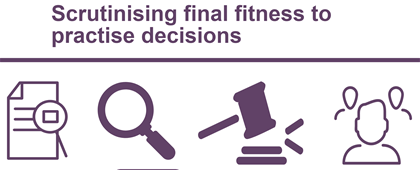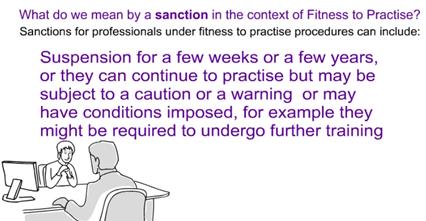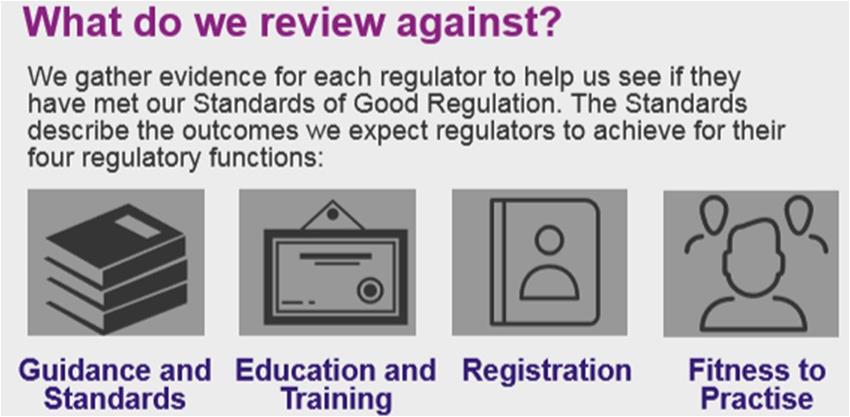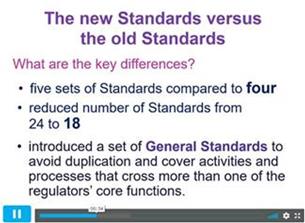Regulatory news

Reviewing the regulators: scrutinising final fitness to practise decisions
Appeals/cases
We have settled four cases by agreement from all the parties involved (the Authority, the regulator and the registrant). Three of these cases related to decisions by the Nursing and Midwifery Council (NMC) panels and one was a decision by the Health and Care Professions Council (HCPC).
A nurse working in residential care who slapped a wheelchair-bound patient
The first case involved a nurse working in a residential care facility for vulnerable young adults who slapped a wheelchair-bound and non-communicative patient when the patient grabbed him. The panel imposed suspension for 12 months. We were concerned that, because the nurse did not attend the hearing to show that he understood the seriousness of his actions and outline what steps he would take to learn from his mistakes, he presented a risk to other patients in the future. All parties agreed that the nurse should be struck-off.
A mental health nurse who discharged a suicidal patient against his wishes
The second case related to a mental health nurse who assessed a patient with mental illness and at risk of suicide. The patient was discharged against his wishes and subsequently killed himself. In an investigation into the patient’s death by the NHS trust and the report for a coroner’s investigation, the nurse made statements about the adequacy of the assessment that had been carried out. The patient had recorded the assessment undertaken by the nurse – this recording was found after his death. The recording revealed the assessment was inadequate and the nurse had been dishonest in what she had told both her employer and the coroner about her involvement with the patient. The panel imposed a caution for three years. When we looked at the panel decision, we were concerned that the panel had not treated the nurse’s dishonesty seriously enough. There is an obligation on health and care professionals to be honest when things go wrong (known as the professional duty of candour). The Authority, the NMC and the registrant agreed that the nurse should be suspended for six months.
You can find out more about the professional duty of candour and what progress the regulators have made in embedding it in our latest research Telling patients the truth when something goes wrong - how have professional regulators encouraged professionals to be candid to patients?
A nurse involved in a verbal and violent confrontation with a patient in a mental health facility
The third case related to a nurse who was involved in a verbal and violent confrontation with a patient in a medium secure mental health facility. When investigated, the registrant blamed the patient for provoking him. The registrant did not attend the hearing. The panel imposed a suspension order for 12 months. We were concerned that the panel had not given sufficient weight to the seriousness of the registrant’s behaviour, particularly because of the vulnerability of this patient, who was entitled to expect that those charged with caring for him would care and protect him. The registrant had provoked the patient and continued with his violent conduct despite colleagues seeking to diffuse the situation. The case was settled by consent with the registrant being erased from the register.
A physiotherapist with suspected health conditions
The last case was an HCPC decision relating to a physiotherapist with suspected health conditions. The panel had found that the physiotherapist did suffer from health conditions, but that this was not sufficient to establish that her fitness to practise is impaired. We were concerned that the panel had not properly considered the expert evidence on the physiotherapist’s need for ongoing support to ensure there were no relapses when deciding whether the case could result in a finding of impairment. All the parties agreed that the physiotherapist could be voluntarily removed from the HCPC’s register.

Cases waiting to be heard by the Court
There are currently six appeals (submitted under Section 29) awaiting hearing before the High Court. One was heard on 6 February 2019 and, at the conclusion of the hearing, the Court has reserved its decision. Another appeal will be heard on 20 February 2019. We await dates for the remaining cases.
Reviewing the regulators: performance reviews

The revised Standards of Good Regulation
The Standards of good regulation help us in our work reviewing the nine health and social care regulators to check how well they are protecting the public and maintaining confidence in the professions they register. There are currently 24 Standards covering the regulators' four core functions:
- Guidance and Standards
- Education and Training
- Registration
- Fitness to Practise.
The revised Standards were approved by the Authority’s Board at its meeting in November 2018. This followed a process involving two public consultations which sought responses from the regulators and other stakeholders. The new Standards have rationalised the current 24 Standards to 18, including five new General Standards. We will continue to assess the regulators against the areas of guidance and standards, education and training, registration and fitness to practise.
We are now developing the evidence framework that will sit alongside the new Standards to inform our assessments of the regulators. In late January and early February 2019, we held meetings with the regulators to gain their input to the evidence framework ahead of using this to pilot the new Standards. We will be working closely with the regulators to pilot the Standards and test the evidence framework during 2019, ahead of their full implementation for our 2019/20 performance review cycle which begins at the end of 2019. The current Standards will remain in use for the 2018/19 performance review cycle, with the pilots running alongside this process.

Find out more about the consultation and the new Standards or watch this short animation which explains more about how the Standards have been reduced and rationalised from 24 to 18.
Performance reviews published
Since our last newsletter, we have published performance reviews for: